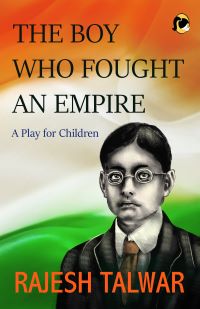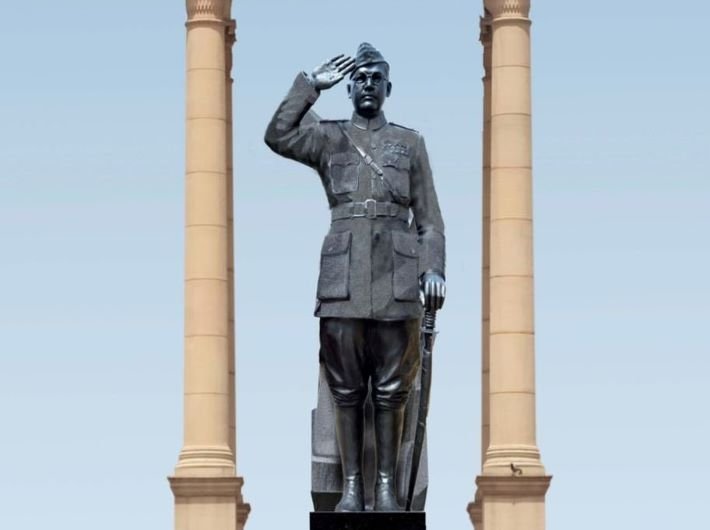Rajesh Talwar’s new play for children celebrates the life of Subhash Chandra Bose, marking his 127th birth anniversary
The Boy Who Fought an Empire
By Rajesh Talwar
Ponytale Books, 166 pages
 As the nation marks the 127th birth anniversary of Netaji Subhash Chandra Bose on January 23rd, Rajesh Talwar, a former UN official who is also a lawyer and best-selling author, has come out with his new play for children that teaches standing up against bullies, ‘The Boy Who Fought the Empire’.
As the nation marks the 127th birth anniversary of Netaji Subhash Chandra Bose on January 23rd, Rajesh Talwar, a former UN official who is also a lawyer and best-selling author, has come out with his new play for children that teaches standing up against bullies, ‘The Boy Who Fought the Empire’.
The author, whose 'The Boy Who Wrote A Constitution’ made it to the shortlist for the PVLF Author Excellence Awards 2022, has his third book out in the series that aims at re-introducing our national heroes to children in an interesting format.
‘The Boy Who Fought the Empire’ is a compelling and enlightening playwright featuring five schoolchildren, to bring Netaji's life to light. The narrative delves into Netaji's childhood, his courageous stand against bullying at Presidency College, and his remarkable journey of raising an army to challenge the British Empire.
This is Talwar’s fourth play for children. That first play was titled ‘Playwrights: A Play for Children on Human Rights’. ‘The Boy Who Wrote a Constitution’ was his second play focusing on the challenging childhood and boyhood years of Babasaheb Ambedkar. His third and most recent play for children, published in 2023, was on M K Gandhi with the self-explanatory title, ‘The Boy Who Became the Mahatma’. Talwar has previously written a non-fiction book on Netaji, ‘The Vanishing of Subhash Bose: The Mystery Unlocked’.
“In my view, this work is at least as significant and important as the previous two plays on Babasaheb Ambedkar and Mahatma Gandhi. As was the case in the previous two books I did not want to rely overly on third-party historical accounts of Subhash Bose’s life but use his own words, to the extent possible,” Talwar states in his afterword to the latest play.
Here is an excerpt from his ‘Postface’, explaining the choices he made in writing this work:
POSTFACE
In the interests of creating a lively engaging play there have inevitably been minor alterations to the sequence of events here and there, but for the most part I have tried my best to stick with the facts. As in my previous historical plays, for the purpose of creating a more authentic text, here too I have frequently used Subhash Bose’s own words that he had written out in his autobiography while taking care not to use his words out of thematic context.
In his youth Subhash was a gregarious personality even if he was extremely private in certain respects. He had many friends, but in respect of the opening scenes of the play, they have all been collapsed into a single one. Kalyan, the friend who features prominently in the earlier part of the play is a fictitious character. Similarly, Subhash Bose came from a large family and had very many uncles, but the maternal uncle who features in the play, Uncle Joy is not based on any specific character or personality but is a fictional character.
The young woman Nitya Ramaswamy who joins the INA is not based or modelled on a specific individual. Nonetheless, her burning enthusiasm for the cause is representative of the feelings of many young women who subsequently became part of the Rani of Jhansi Regiment. Towards the end of this play when Netaji is engaged in a conversation with three generals and the commandant of the Rani of Jhansi regiment, the generals are not based on specific individuals. Subhash Bose had men and women from all communities in the army he raised and in order to make them representative, the scene features a Sikh general, a Hindu general and a Muslim general. The three prisoners of war that Netaji meets in a Japanese jail are also not modelled on any particular individual(s) but are similarly intended to be representative.
The above-mentioned fictional elements and characters were also introduced to keep the list of characters in the play manageable and helped in creating an engaging and cohesive narrative. Leaving aside these aspects, the play has tried to stay true to events as they transpired.
Not only has the play tried to stay as historically accurate as possible, it is also up-to-date with fresh evidence concerning the life and times of Subhash Chandra Bose. In one of the scenes in the play one of the children asks the other whether Subhash Bose was a great admirer of Hitler, and Milan, who is also the playwright responds that the Indian patriot wished to taken the help of anyone who could help India gain freedom. As a matter of fact, Netaji did not particularly admire the Fuhrer. This is now a matter of historical record. The truth of the matter as recounted in Madhusree Mukerjee’s award winning ‘Churchill’s Secret War: The British Empire and the Ravaging of India during World War II,’ is that Netaji privately confessed that he had hardly met anyone in his life who was as obstinate and unwilling to listen to a different point of view as Hitler was. When Netaji met the Fuhrer, he did not meet him as a supplicant but as a proud Indian. He urged Hitler to withdraw the uncomplimentary references to Indians that the German leader had made in the past.
It is also not commonly known that even while working with the so-called Axis powers Netaji tried his level best to provide food assistance to a starving nation during the course of the completely preventable Bengal famine. Documents cited in Mukerjee’s book show how offers were repeatedly made by Subhash Bose to Winston Churchill, the British Prime Minister to permit ships to carry rice from Burma to India. Alas, such lifesaving suggestions were turned down. That historical event has also been dramatized towards the end of this play.
I have endeavoured to limit the number of scenes in this play. In order to do so I had to resort to partitioning the stage at several junctures to integrate scenes where possible and thereby reduce the overall number of scenes. Those enacting the play are at liberty to have shorter, separate scenes if they do not have a stage that is large enough to be partitioned. The same applies to street theatre productions.
In the initial scenes of the play where Netaji is a child or a young boy, I have chosen to address Netaji as simply Subhash. In fact, it would look odd to use any other form of address for a young boy or adult. When he is a character speaking, he is simply Subhash. When there is a reference to him, I mostly use Subhash Bose instead of the full form of Subhash Chandra Bose which appears overly formal for a book of this nature. It is only once he is an adult that I shift to a more frequent use of Netaji.
Subhash Bose led such an eventful life that it was a challenging task to decide what to include and what to exclude. There was also the issue of determining whether the material sought to be included was child appropriate. It took me days of deliberation before I eventually decided to include the scene in which Subhash confronts a teacher (Scene 7). Given that the play is meant to be performed by children, I had to think long and hard as to whether the inclusion of such a scene was appropriate. Would it not set a bad example? In his dealings with Indian students
at the Presidency College, the English teacher Edward Farley Oaten was given to frequent racist utterances and inflicted violent punishment on students for perceived transgressions. As young Subhash says in the play bullies must be confronted even if they are teachers. It is also a matter of historical record that Mr Oaten, the teacher, underwent a transformation subsequently and even penned an emotional poem in memory of his former student upon learning of his death!
[Excerpt reproduced with permission of the publishers.]
